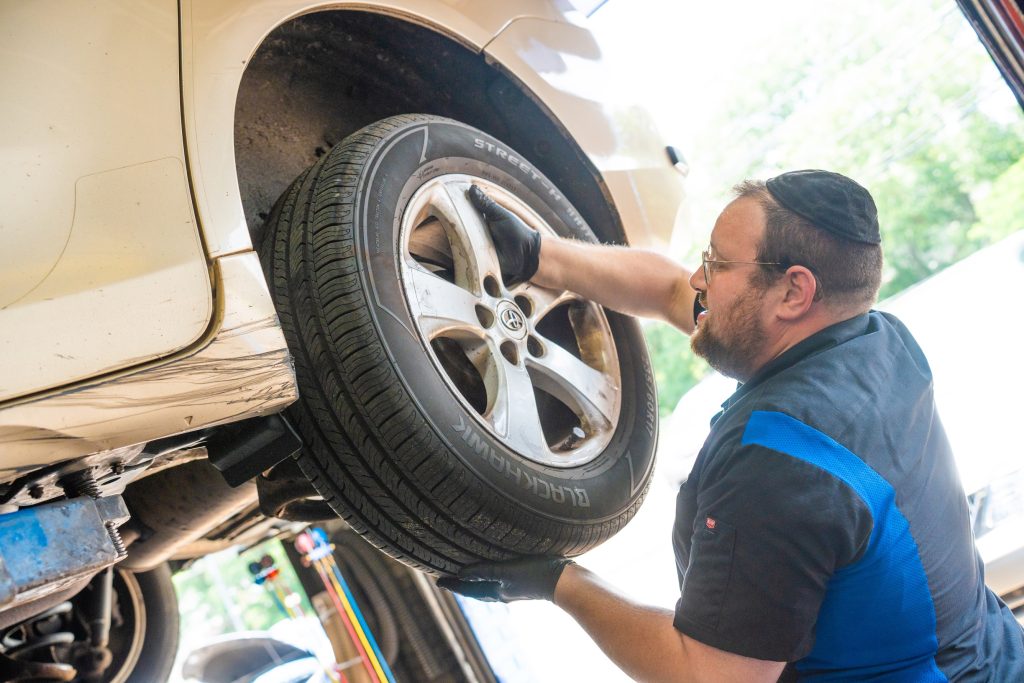Ask the MECHANIC: How can I tell if my brakes are going?

There are several signs that can indicate your brakes may be worn out. However, they’re not foolproof, and I’ll explain with each one why that is. The best and most assured way to know if your brakes are going is to have them physically looked at by a mechanic. When you go for oil changes, part of the inspection process should be looking at the brakes. This way you can keep tabs on them throughout their lifecycle. Also, remember that drum brakes, like we discussed last week, are a closed system and hard to check from the outside. They also last far longer, so the best mehalach for them is to only check when there are serious symptoms, since disassembly to inspect the shoes carries a risk of breaking them, not to mention the cost of time.
GRINDING This is the most severe symptom of brake wear. You can’t miss it, it sounds pretty scary. This occurs because of the brake pad which is made of a lining attached to a metal plate (think of the lining like metal shavings and other compounds mixed with glue). In this case, the lining has fully rubbed out, leaving only the metal backing plate hitting the rotor. You should not drive like this for any real length of time. Basically, go straight to the shop. It can cause further damage and even be dangerous if the brake fluid leaks when the caliper piston is overextended, which would make the brake pedal stop working. This symptom is kinda easy to tell by yourself but it’s not really a symptom of them going as much as them just being gone.
SQUEAKING This is the little cousin of grinding and should give you a nice amount of advance warning. This type of squeak happens when a little metal tab attached to the backing plate starts hitting the rotor to warn you that the brakes should be changed. They are usually set at 3 mm into the brake lining, which when new is 12mm or about half an inch thick which is when they should be changed. The problem is, not all pads come with these wear indicators, (Toyota notably doesn’t), so it’s not a reliable warning. Also some pads will always squeak because of either rust buildup, improper installation or inferior pads. So sometimes they always squeak, sometimes never, and unless you check the thickness of all four pads, you really have no idea what it means.
FADING When the brakes are at the end of their life (sub 3mm) they will not have the same stopping power as new brakes. This is due to the fact that the brake works by dissipating heat and thinner pads won’t absorb all that heat. So if a thin brake pad gets too hot you will experience fading and the brakes can lose a lot of their stopping power. In practice, however, this is pretty subjective and the difference in stopping power is not nearly as dramatic as people expect. On the flip side, some people will see a problem where there is none and I find when people call to say they feel their brakes are not stopping like they used to, it’s hit or miss as to whether they need brakes.
VIBRATION This occurs when the rotor is not perfectly round. Because the rotor spins with every rotation of the wheel, when the brakes are held tight against the rotor (which only happens when your foot is on the pedal), the uneven part of the rotor will shimmy the brake pads as it hits that part of the rotation. When that happens with every spin it feels like a vibration. It’s worth noting that this is a rotor problem, so it can happen long before the pads are worn down. If this keeps happening to you I would recommend getting harder rotors and high quality pads. The cause of rotor warping is excessive heat. Better-quality brake parts are both more resistant to and better at handling heat, so that usually solves the problem. Also, that shuddering feeling could come from other car parts, some of which can be dangerous, so vibration alone isn’t always a reliable sign.
SENSOR Some cars, especially German ones and certain Ford Transits, have brake sensors with a wire that breaks as it wears away, similar to the wear-indicator clips. That’s usually pretty reliable but does not exist in most cars. And just to wrap it up, a soft or hard brake pedal is not a sign of bad brakes, but rather a problem with the hydraulics or power boost, which I’ll have to explain in another article.
Stay safe!
Tzali
